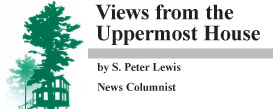Tripping over the threshold of the future
Our home, hemmed by fields and forest just off the west shore of Crotched Pond, is as old as the state of Maine — both were hammered together from howling wilderness in 1820.
wilderness in 1820.
Like Maine, our old farmstead rests on a foundation of granite, is bound on one side by the rising and falling sea (our tides occurring regularly in our wet basement), and has an interior laced with hills and valleys. But while Maine’s rugged terrain was gnawed and masticated into shape by glaciers, our home’s tilts and wrinkles are just the result of settling, rot, and warp. First-time visitors to Maine often find the up-and-down-and-all-around travel disorienting, and so also first-time visitors to our home: it’s fun to watch people from away navigate the little moraine tossed up as a threshold between our kitchen and dining room — they invariably trip, wobble a little, and then glance back at their tracks to see what in the world just happened.
And, also like Maine, it takes a lot of work to keep our old place going. At the end of my family’s fiscal year, after all the digging and plowing and scraping and painting, after all the pruning and cutting, after all the hours of discussion, the endless committee meetings, the votes, and finally, the toil; when all the income has been piled up, the bond issues totaled, the dips into the emergency fund recorded, the promises reiterated, the credits and debits parlayed, and the budget hung in the balance, we look around our old house and feel, well, taxed. And so we sit down on the couch with an exhausted sigh, put our feet up, think about borrowing money from China, and stare toward heaven.
Just after we moved into our old place, back in 1999, I noticed a strange splinter in the dining room ceiling. Between the exposed beams, a two-inch snag of old dry pine had been pried from the underside of the wide flooring in the bedroom above by the downward trajectory of the pointy end of an ancient square-cut nail.
I used to fantasize about that nail, to think about the builders so long ago who hauled the granite and dug the wells and felled the trees and cut the timbers and drove those cut nails; to wonder if perhaps this was the very last one; that on some chilled and taut November day the last man swung the last hammer and rammed the last nail home into a ceiling that he had no idea would one day be mine. And that in that last blow the last nail pried out a last splinter, down and away, but with its little stump still holding fast to its mother board, forming a spring of sorts, a pent-up thing, tense and ready to give way — potential energy stored up from the time of President James Monroe.
I would look for that old splinter from time to time in my travels, and it comforted me somehow, that little bit of energetic permanence in a lazy and temporary world. I’d give it a wink. “Hang in there,†I’d say.
Last week, our great nation held its midterm elections and from all across our land the pent-up energy of the electorate was released from behind curtains with snapping pencil tips. Things changed. Overnight.
I looked for my splinter the next day as I walked in my socks northwest along the little ridge in the dining room floor. But it was gone. Something had happened. The environment had gotten to dry, perhaps, and the base of the splinter buckled under the pressure and that old piece of pine just cracked off and fell to the floor. I got on my hands and knees and looked around for it, but found nothing. Perhaps it had fallen between the cracks of one of the old planks, or been had batted into a dark corner by a cat. I creaked upright slowly, knowing only that things would just never be the same.
And so it seems that whether in the state house, the Blaine house, or in my own house, the time comes when enough is enough, the pressure gets too high, foundations weaken, and something has to give. Eventually, everything snaps — and we’re left looking back at our tracks to see what we tripped over, to see what in the world just happened.


